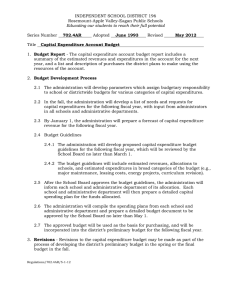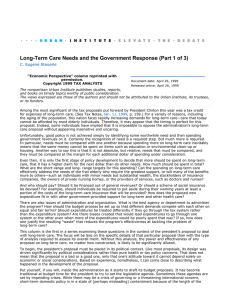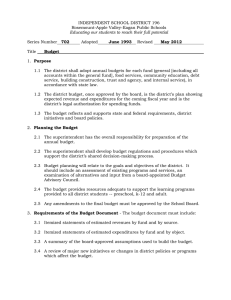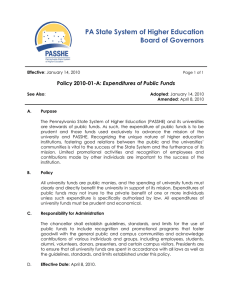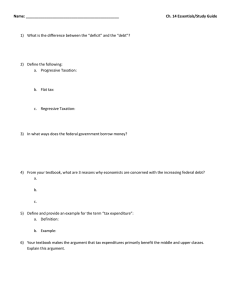The New Old Tax Expenditure Debate, Part 3 C. Eugene Steuerle
advertisement
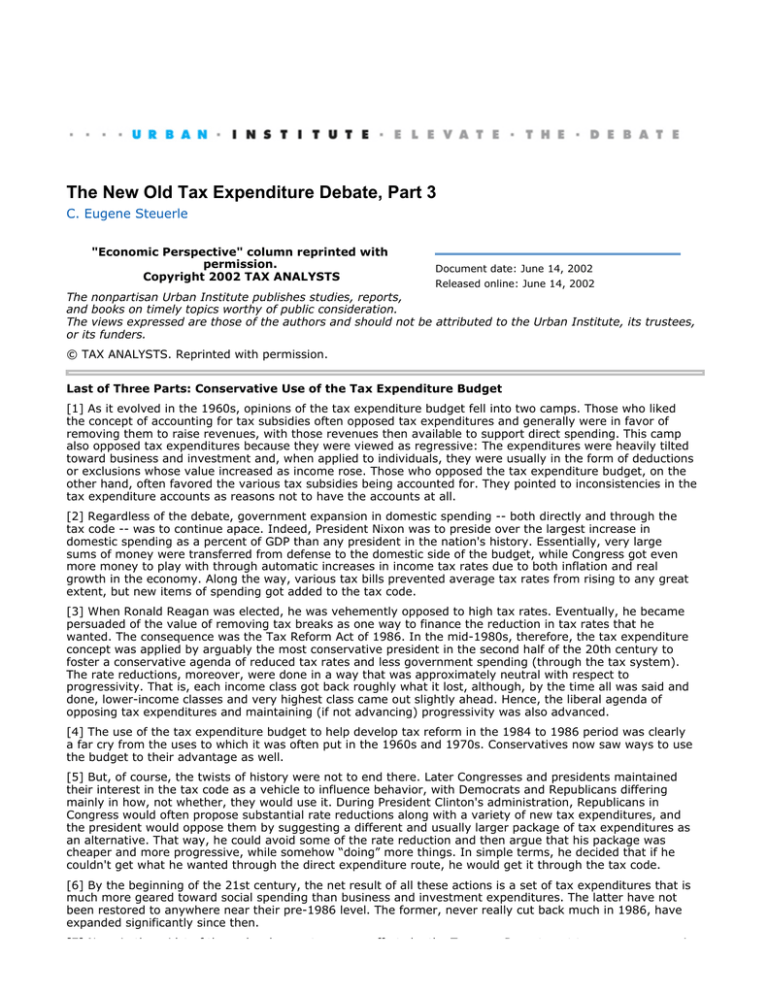
The New Old Tax Expenditure Debate, Part 3 C. Eugene Steuerle "Economic Perspective" column reprinted with permission. Copyright 2002 TAX ANALYSTS Document date: June 14, 2002 Released online: June 14, 2002 The nonpartisan Urban Institute publishes studies, reports, and books on timely topics worthy of public consideration. The views expressed are those of the authors and should not be attributed to the Urban Institute, its trustees, or its funders. © TAX ANALYSTS. Reprinted with permission. Last of Three Parts: Conservative Use of the Tax Expenditure Budget [1] As it evolved in the 1960s, opinions of the tax expenditure budget fell into two camps. Those who liked the concept of accounting for tax subsidies often opposed tax expenditures and generally were in favor of removing them to raise revenues, with those revenues then available to support direct spending. This camp also opposed tax expenditures because they were viewed as regressive: The expenditures were heavily tilted toward business and investment and, when applied to individuals, they were usually in the form of deductions or exclusions whose value increased as income rose. Those who opposed the tax expenditure budget, on the other hand, often favored the various tax subsidies being accounted for. They pointed to inconsistencies in the tax expenditure accounts as reasons not to have the accounts at all. [2] Regardless of the debate, government expansion in domestic spending -- both directly and through the tax code -- was to continue apace. Indeed, President Nixon was to preside over the largest increase in domestic spending as a percent of GDP than any president in the nation's history. Essentially, very large sums of money were transferred from defense to the domestic side of the budget, while Congress got even more money to play with through automatic increases in income tax rates due to both inflation and real growth in the economy. Along the way, various tax bills prevented average tax rates from rising to any great extent, but new items of spending got added to the tax code. [3] When Ronald Reagan was elected, he was vehemently opposed to high tax rates. Eventually, he became persuaded of the value of removing tax breaks as one way to finance the reduction in tax rates that he wanted. The consequence was the Tax Reform Act of 1986. In the mid-1980s, therefore, the tax expenditure concept was applied by arguably the most conservative president in the second half of the 20th century to foster a conservative agenda of reduced tax rates and less government spending (through the tax system). The rate reductions, moreover, were done in a way that was approximately neutral with respect to progressivity. That is, each income class got back roughly what it lost, although, by the time all was said and done, lower-income classes and very highest class came out slightly ahead. Hence, the liberal agenda of opposing tax expenditures and maintaining (if not advancing) progressivity was also advanced. [4] The use of the tax expenditure budget to help develop tax reform in the 1984 to 1986 period was clearly a far cry from the uses to which it was often put in the 1960s and 1970s. Conservatives now saw ways to use the budget to their advantage as well. [5] But, of course, the twists of history were not to end there. Later Congresses and presidents maintained their interest in the tax code as a vehicle to influence behavior, with Democrats and Republicans differing mainly in how, not whether, they would use it. During President Clinton's administration, Republicans in Congress would often propose substantial rate reductions along with a variety of new tax expenditures, and the president would oppose them by suggesting a different and usually larger package of tax expenditures as an alternative. That way, he could avoid some of the rate reduction and then argue that his package was cheaper and more progressive, while somehow “doing” more things. In simple terms, he decided that if he couldn't get what he wanted through the direct expenditure route, he would get it through the tax code. [6] By the beginning of the 21st century, the net result of all these actions is a set of tax expenditures that is much more geared toward social spending than business and investment expenditures. The latter have not been restored to anywhere near their pre-1986 level. The former, never really cut back much in 1986, have expanded significantly since then. [7] Now, in the midst of these developments, comes efforts by the Treasury Department to assess once again [7] Now, in the midst of these developments, comes efforts by the Treasury Department to assess once again the tax expenditure budget. Done the right way, the exercise has merit, as many of the complaints of the tax expenditure critics are valid. For instance, there are many inconsistencies in that budget. To mention only a few, it does not count negative tax expenditures or double taxation of some forms of income, it still treats the income from housing and durables incorrectly (implying that borrowers are favored over equity owners, which they are not), and it doesn't include -- as it should -- the value of the exemption from taxation of many government- provided services. [8] My guess is that good Treasury analysis will address these issues. But Treasury may have trouble appeasing those opponents of the budget who really have a much more narrow agenda in mind: The removal of taxes on capital income any way it can be achieved. I mentioned above the double taxation of some items; capital income is often the victim here. But many opponents also want a consumption tax and non-taxation of capital income altogether. Treasury can try to develop a consumption tax expenditure budget -- it could prove to be an interesting and useful exercise -- but it is not clear that this is what the interest groups want to expose either. [9] None of the legitimate criticisms, however, justifies an attack on accounting for what government does. Of all departments in government, Treasury has the greatest responsibility for demanding good accounting, regardless of whether the accounting is for items that some people like or dislike. Moreover, any analysis must be done with intellectual rigor, which means that if one is to develop a consumption tax budget, one must still note which items and industries are relatively preferred and which are not. Among the exceptions to a consumption tax base are negative consumption taxes, as is the case with some highly leveraged investment. And, of course, the deduction of interest expenses would be treated as a preference in a consumption tax expenditure budget, while borrowing would be treated as adding to taxable consumption unless it was put into saving or investment. [10] Finally, as noted, the share of the tax expenditure budget devoted to social expenditures has risen considerably. Opponents of the tax expenditure budget with a clear political agenda of lowering the taxes on capital could find that their reward is a higher tax on capital to support the social tax expenditures whose accounting they also discredited. Other Publications by the Authors C. Eugene Steuerle Usage and reprints: Most publications may be downloaded free of charge from the web site and may be used and copies made for research, academic, policy or other non-commercial purposes. Proper attribution is required. Posting UI research papers on other websites is permitted subject to prior approval from the Urban Institute—contact publicaffairs@urban.org. If you are unable to access or print the PDF document please contact us or call the Publications Office at (202) 261-5687. Disclaimer: The nonpartisan Urban Institute publishes studies, reports, and books on timely topics worthy of public consideration. The views expressed are those of the authors and should not be attributed to the Urban Institute, its trustees, or its funders. Copyright of the written materials contained within the Urban Institute website is owned or controlled by the Urban Institute. Source: The Urban Institute, © 2012 | http://www.urban.org
